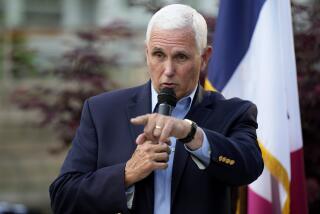POLITICAL BRIEFING
- Share via
ONE MAN’S GUESS: Former Massachusetts Sen. Paul E. Tsongas is running for President, not prophet, but during his announcement swing last week he ventured a prediction on the final shape of the contest for the 1992 Democratic nomination. By the time voting begins next February, Tsongas said, he expects to be jostling for votes with Govs. Mario M. Cuomo of New York, L. Douglas Wilder of Virginia and Bill Clinton of Arkansas, Tennessee Sen. Albert Gore Jr. and two-time candidate Jesse Jackson.
None of those potential competitors can announce too soon for Tsongas, who knows that without more established candidates in the Democratic race, the press and public will continue to treat it as something of a junior varsity contest. “From my point of view, I need them out there so we can have a discussion, so I can test my ideas against their ideas,” he said.
In the meantime, Tsongas plans three trips to Iowa in May and two in June. And he plans to spend the first two weeks of July with his family in that state--beginning, appropriately enough, with a visit to the Dyersville cornfield carved into a mystical baseball diamond for the movie “Field of Dreams.”
FOLDING THE “BIG TENT”: Looking ahead to their national convention next year in Houston, Republicans have been counting on a harmonious celebration that will get President Bush’s reelection drive off to a flying start. But the explosive issue of abortion threatens to cloud that bright prospect.
Furious at party Chairman Clayton K. Yeutter’s recently announced opposition to “any significant change” in the 1988 platform’s hard line against abortion, GOP abortion rights advocates are in a fighting mood--ready to take their struggle for a more flexible plank to the convention floor.
They say that Yeutter’s stance contradicts former Chairman Lee Atwater’s vision of the GOP as “a big tent, with room for diverse opinions on the abortion issue” and also the beliefs of most rank-and-file Republicans. “This is an issue that transcends party loyalty,” says former national committee co-chairman Mary Dent Crisp, head of the 5,000-member National Republican Coalition for Choice.
WHAT A DIFFERENCE A YEAR MAKES: A year ago, President Bush was barely on speaking terms with Rep. Richard A. Gephardt of Missouri, the House Democratic majority leader and presidential hopeful. Gephardt was Bush’s most outspoken critic on Capitol Hill, and reporters had discovered that the quickest way to get under the President’s skin was to mention Gephardt’s name.
Today, Bush is deeply engaged in an elaborate effort to court Gephardt, seeking his support, or at least neutrality, in the current congressional fight over trade legislation.
Bush’s aides and the President himself have been going out of their way to say nice things about Gephardt. Last Thursday, for example, Bush praised Gephardt’s willingness to keep an open mind on his trade proposals, saying that Gephardt had shown “the proper spirit and approach.”
Gephardt’s neutrality on the trade issue so far also hints of a major shift in Democratic politics. During 1988, trade protectionism formed the center of Gephardt’s bid for his party’s presidential nomination, and opposition to Bush’s proposals remains the top priority of traditionally Democratic unions. But many Democratic strategists argue that the party will lose drastically if it follows the unions’ lead on the issue--that this would alienate Latinos, many of whom favor free trade with Mexico, as well as suburban voters.
More to Read
Get the L.A. Times Politics newsletter
Deeply reported insights into legislation, politics and policy from Sacramento, Washington and beyond. In your inbox twice per week.
You may occasionally receive promotional content from the Los Angeles Times.









